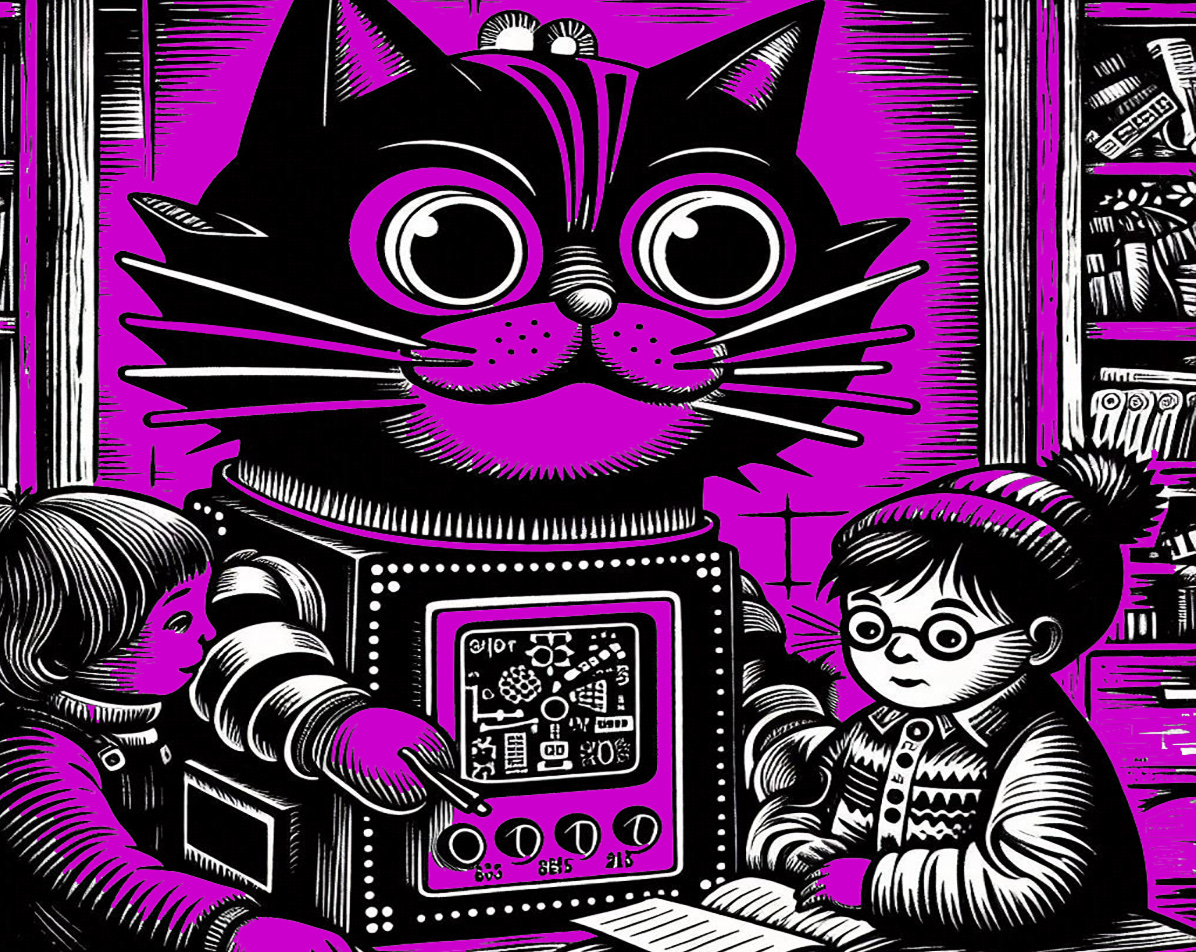Chalkboards to chatbots: How should we prepare children for an AI future?
Stark lessons in what kids really think and know about AI
I've been getting down with the kids – literally – doing career talks at local schools. I wanted to share my wiggly, unorthodox route into tech while secretly gauging their feelings about AI.
I approached my first primary school class with trepidation – and limited knowledge of how an 8-year-old’s brain thinks about work. Channelling vibrant Parisian chic, or so I thought, I told them I studied the arts. Then I asked what job they thought I did.
Pop star (Former. I'll take it). 🎤
Mime artist. Comedian. Clown (oof). 🤡
Factory worker. 👩🏽🏭
My favourite: a woman who runs a pink shop (the dream).🏪🩷
None of the classes, ages 8 to 12, guessed I worked in tech. Intentionally, I don't match the media's tech bro or cyber gal stereotype. I explained how curious non-STEM people can work in tech communications as talking tech to non-nerds is a valuable skill.
I brought a bag of props: creative awards, vinyl (some kids recognised these as weird devices for playing music. None identified my wax cylinder single as such), a Delia Derbyshire diorama, a matryomin (a theremin inside a Russian doll, famous for this Guinness World Records attempt)🪆to illustrate how I combine music and technology creatively.
Boys showed interest in computers and games as career paths. When asked about AI, they all grasped the concept. Younger ones mainly understood AI as robots. Older classes understood AI as software. Some said they used ChatGPT for homework (in front of their teacher). I hope with parental supervision, as it's not yet child-safe.
We discussed how many future jobs don't exist today (85%, according to a 2017 HuffPo piece). My first job (informally titled ‘web girl’) didn’t exist in 1994 when I chose my A Levels.
Killer question:
Do you think AI will change your life and what job you may do?
Some feared their parents’ jobs may disappear. Others thought if AI would end up doing everything it could be fun. It’s bleakly existential for a child to worry about technology taking a job they don't yet have, that may not yet exist.
This adolescent techno-reality check is global. In the US, mechanical skills are regaining popularity as AI threatens white-collar work. Today’s American teenagers are disengaged. If AI mitigates the need to learn about Pythagoras or algebra, why bother?
AI is too tempting as a 'homework machine'. Even if schools ban it, exhausted parents will turn to it for help with complex subjects. Research from Microsoft and Carnegie Mellon shows excessive AI dependence can diminish critical thinking, literally rotting our brains. The solution isn't banning technology but integrating tech into learning.
How could AI shift from entropy to learning?
OpenAI produced a cute film with my friend in the north, Phil Birchenall. He created a custom GPT to help his daughter struggling with maths. Izzy the Maths Tutor is a personalized learning tool with dog-themed questions.🐶
Imagine every child starts school with an AI tutor with a daily personalised curriculum. It can stretch you by asking questions and testing what you know. Teaching methods — a teacher with 30+ students in front of a board — haven't changed much in a century. Education’s ripe for AI disruption.
We need to prepare children for the future, hurtling towards them at a frightening speed.
Beijing elementary students will receive mandatory AI education covering AI basics, homework assistance and ethics. Arizona approved the first AI curriculum. In Nigeria, students completed two years of learning in just six weeks with personalized AI tutors.
Generative AI shouldn't undermine education but it can support it by enriching learning, like building an interactive Industrial Revolution timeline or giving real-time feedback on a creative writing assignment.
The question isn't if AI will impact young people’s lives, but how we prepare them for it and be ready to face global competition.
Like the children I met in Paddington, kids’ understanding of AI isn't entirely positive. The Children's AI Manifesto, co-produced with young people and the Turing Institute, shows children want cleaner, transparent, ethical AI futures — as should we all.
Overlay AI and business skills for success
I then did my spiel with 16–17-year-olds in an IT class, though they were in the "mute stage." Tough crowd.
Afterwards, a student choosing between business studies and electrical engineering asked for advice. I said do what you’re good at and what you enjoy. My music and drama degree has proven invaluable for selling everything from incontinence pants to quantum computing. Avoiding technology is impossible, as I discovered while teaching digital branding to pottery makers in rural Derbyshire.
Successful people overlay tech on existing skills. Like the first artist streaming concerts from home (Sandi Thom, my label mate with Dawn of the Replicants. A genius PR move by maverick pig-farmer-turned-music-mogul Ian Brown). Or the gardener using Zapier and AI voice mode to automate quotes and invoices.
Girls rage against the machine
My killer question to the girls:
Would my story make you think about working in tech?
The contrast was stark. Girls aged 8-9 were receptive. If a woman with purple hair and a pink hat can do it, perhaps I can too. But by age 10, their interest waned. Boys remained enthusiastic, while girls wanted to be a photographer or TikToker.
Maybe I wasn't convincing. Or maybe gender archetypes form early. As I've said, the gap in women choosing tech careers begins before 16 and persists. Only 1 in 5 studying advanced AI subjects or entering the industry are women.
Gender differences in AI uptake may start young too. A 2024 Norway Business School study found male students were more likely to use AI even if a professor banned it than the top female students.
AI education will take a global village
There are no quick fixes. Educating 2.5 billion children will take a global village. As professionals, parents and citizens, we must encourage young people, especially girls, to embrace technology. This opens pathways into brilliant future careers and dulls the fear of computers as impenetrable aliens.
First lesson: 30 minutes with small children feels so much longer. Kudos to teachers, this was my toughest gig since facing Simon Cowell.
Second lesson: don't derail your own presentation. I brought Kiki, my trusty meowing robot cat, to illustrate a friendly robot in an unusual form. Once the cat was out of the bag, all attention shifted to where to buy one. For the next classes, I only introduced Kiki after they’d paid attention and asked curious questions. 😻
Whether any of the kids may consider a tech career after my efforts I’ll never know. But ChatGPT searches for “robot cat” in London W2 have skyrocketed.
Get involved
I recommend sharing your career story, however wiggly. Lisa Riemers nudged me to take part in Inspiring the Future programme. Mini-plug: Lisa's brilliant Accessible Communications book is out soon so pre-order now.
I’m back next week with a fortnightly edition of Rethinking the Hype Cycle tech trends.
Apr 2, I’m doing a webinar with TFD agency on communicators’ role in ethical AI storytelling. Do join us.
Until then, keep it curious 🤔
Susi O'Neill
EVA trust in tech
www.evadigitaltrust.com
People-centred tech and AI adoption 🤝 Transparent communications 🎙️ Tech talks and inspiration. Get in touch.



